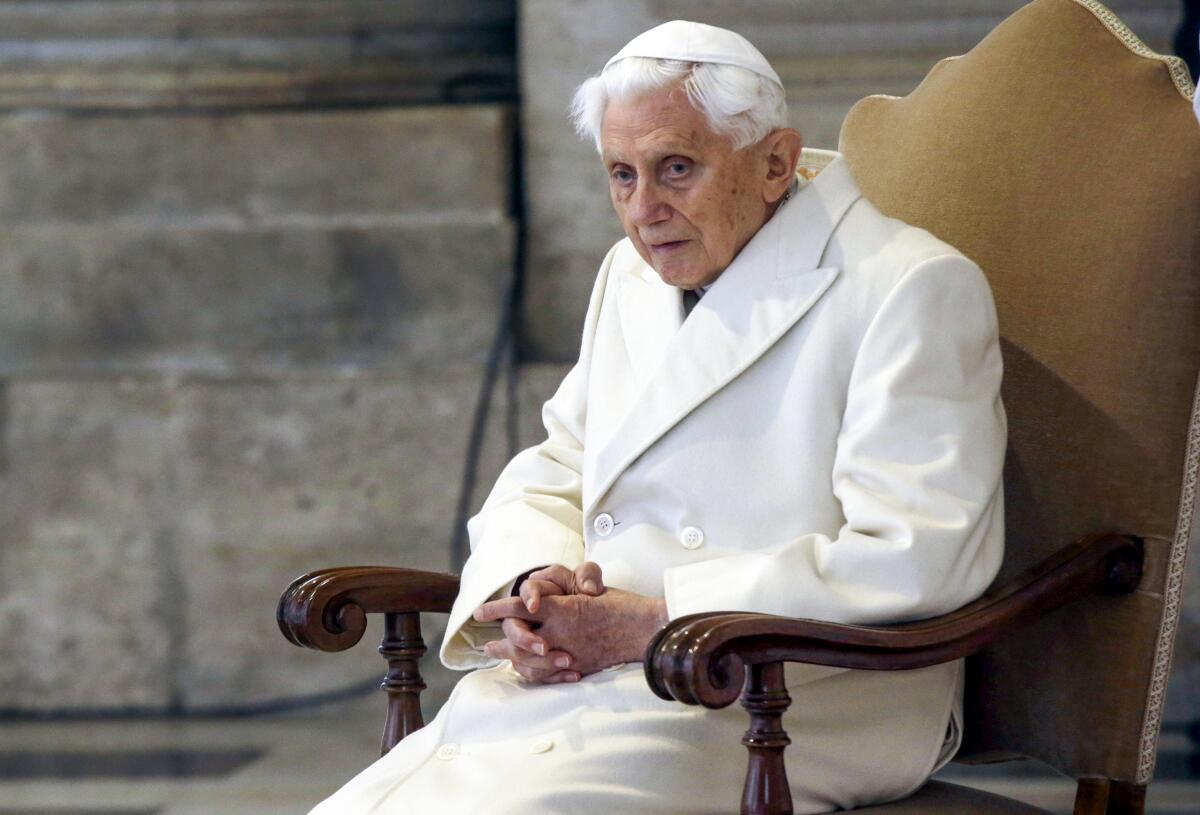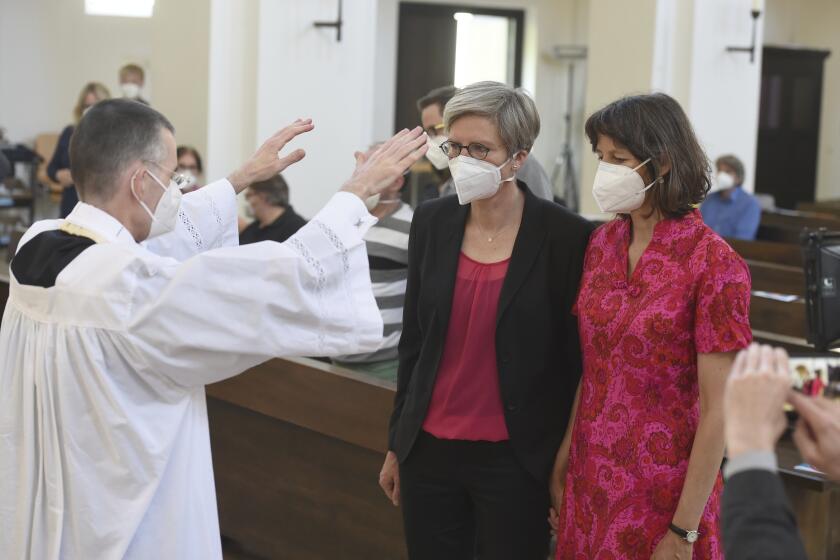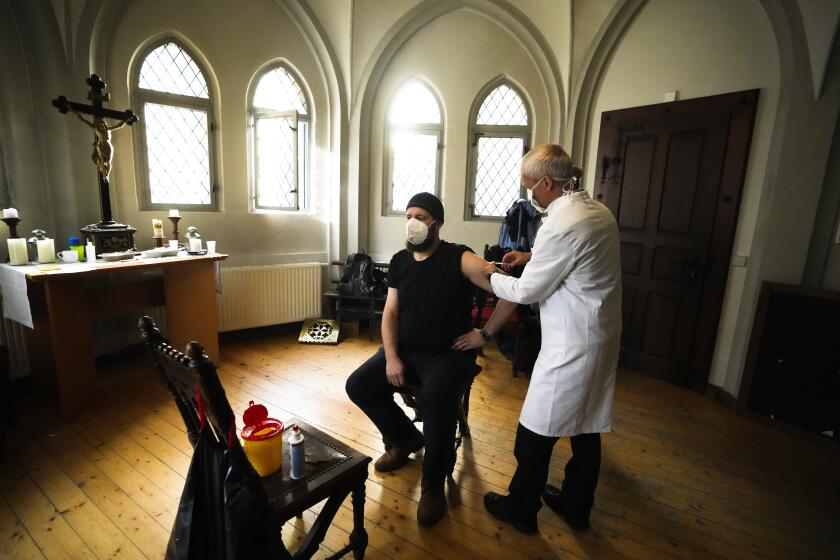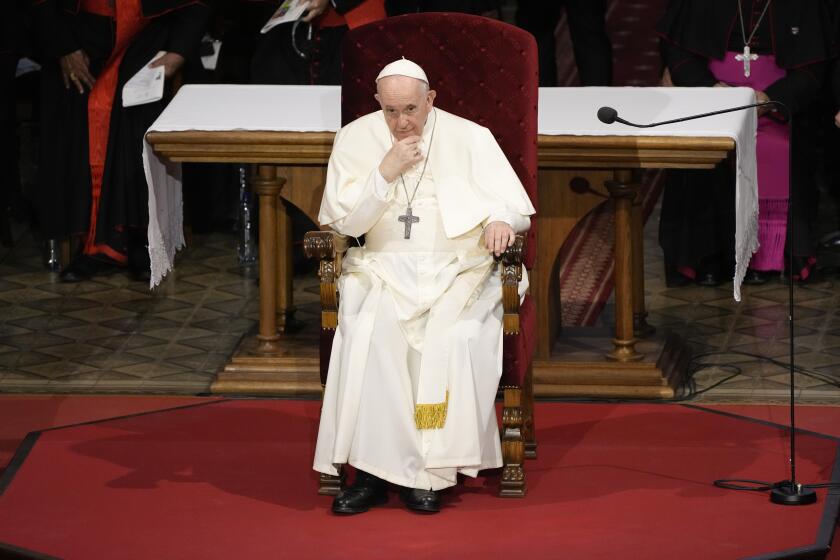Retired pope asks forgiveness over handling of abuse cases but denies wrongdoing

ROME — Retired Pope Benedict XVI asked forgiveness Tuesday for any “grievous faults” in his handling of clergy sex-abuse cases but denied any personal or specific wrongdoing after an independent report criticized his actions in four cases while he was archbishop of Munich, Germany.
Benedict’s lack of a personal apology or admission of guilt immediately riled sex abuse survivors, who said his response reflected the Catholic hierarchy’s “permanent” refusal to accept responsibility for the rape and sodomy of children by priests.
Benedict, 94, was responding to a Jan. 20 report by a German law firm that had been commissioned by Germany’s Catholic Church to look into how cases of sexual abuse were handled in the Munich archdiocese between 1945 and 2019. Benedict, the former Cardinal Joseph Ratzinger, was in charge of the archdiocese from 1977 to 1982.
The report faulted Benedict’s handling of four cases during his time as archbishop, accusing him of misconduct for having failed to restrict the ministry of the priests in the cases even after they had been convicted criminally. The report also faulted his predecessors and successors, estimating that there had been at least 497 abuse victims over the decades and at least 235 suspected perpetrators.
The Vatican on Tuesday released a letter that Benedict wrote in response to the allegations, alongside a more technical reply from his lawyers, who had provided an initial 82-page response to the law firm about his nearly five-year tenure in Munich.
At scores of churches across the country, Germany’s Catholic progressives plan to defy the Vatican’s prohibition on blessing same-sex unions.
The conclusion of Benedict’s lawyers was resolute: “As an archbishop, Cardinal Ratzinger was not involved in any cover-up of acts of abuse,” they wrote. They criticized the report’s authors for misinterpreting their submission, and asserted that they provided no evidence that Benedict was aware of the criminal history of any of the four priests in question.
Benedict’s response was far more nuanced and spiritual, though he went on at length to thank his legal team before addressing the allegations or the victims of abuse.
“I have had great responsibilities in the Catholic Church,” Benedict said. “All the greater is my pain for the abuses and the errors that occurred in those different places during the time of my mandate.”
In the letter, Benedict issued what he called a “confession,” though he didn’t confess to any specific fault. He recalled that daily Mass begins with believers confessing their sins and asking forgiveness for their faults and even their “grievous faults.” Benedict noted that, in his meetings with abuse victims while he was pope, “I have seen at first hand the effects of a most grievous fault.
“And I have come to understand that we ourselves are drawn into this grievous fault whenever we neglect it or fail to confront it with the necessary decisiveness and responsibility, as too often happened and continues to happen,” he wrote. “As in those meetings, once again I can only express to all the victims of sexual abuse my profound shame, my deep sorrow and my heartfelt request for forgiveness.”
Lutheran pastors across Germany’s Saxony state use their sermons and open their churches to promote COVID vaccinations.
His response drew swift criticism from Eckiger Tisch, a group representing German clergy abuse survivors, which said it fit into the church’s “permanent relativizing on matters of abuse — wrongdoing and mistakes took place, but no one takes concrete responsibility.”
Benedict “can’t bring himself simply to state that he is sorry not to have done more to protect the children entrusted to his church,” the group said.
The retired pope’s response will probably complicate efforts by German bishops to try to reestablish credibility with the faithful, whose demands for accountability have only increased after decades of abuse and cover-up.
The leader of the German bishops conference, Limburg Bishop Georg Baetzing, previously said that Benedict needed to respond to the report by distancing himself from his lawyers and advisors. “He must talk, and he must override his advisors and essentially say the simple sentence: ’I incurred guilt, I made mistakes and I apologize to those affected,’” Baetzing said.
But in a tweet Tuesday, Baetzing noted only that Benedict had responded.
”I am grateful to him for that and he deserves respect for it,” Baetzing wrote. The tweet didn’t address the substance of Benedict’s response.
The law firm’s report identified four cases in which Ratzinger was accused of misconduct in failing to act against abusers.
Two cases involved priests whose offenses occurred while Ratzinger was archbishop and who were punished by the German legal system but were kept in pastoral roles without any limits on their ministry. A third case involved a cleric who was convicted by a court outside Germany but was put into service in Munich. The fourth case involved a convicted pedophile priest who was allowed to transfer to Munich in 1980 and was later put into ministry. In 1986, that priest received a suspended sentence for molesting a boy.
News Alerts
Get breaking news, investigations, analysis and more signature journalism from the Los Angeles Times in your inbox.
You may occasionally receive promotional content from the Los Angeles Times.
Benedict’s team had earlier clarified an initial “error” in its submission to the law firm that had insisted Ratzinger was not present at the 1980 meeting in which the priest’s transfer to Munich was discussed. Ratzinger was there, but the priest’s return to ministry was not discussed, they said.
Benedict said he was deeply hurt that the “oversight” about his presence at the meeting had been used to “cast doubt on my truthfulness, and even to label me a liar.” But he said he had been heartened by the letters and gestures of support he had received.
“I am particularly grateful for the confidence, support and prayer that Pope Francis personally expressed to me,” he said.
The Vatican had already strongly defended Benedict’s record in the aftermath of the law firm’s report, recalling that Benedict was the first pope to meet with victims of abuse, that he had issued strong norms to punish priests who raped children and had directed the church to pursue a path of humility in seeking forgiveness for the crimes of its clerics.
Pope Francis celebrates his 85th birthday Friday — the same age that his predecessor, Benedict XVI, was when he retired.
The Vatican’s defense, however, focused primarily on Benedict’s tenure as head of the Holy See’s doctrine office and his eight-year papacy.
Benedict reflected on his legacy at the end of his letter.
“Quite soon, I shall find myself before the final judge of my life,” he wrote. “Even though, as I look back on my long life, I can have great reason for fear and trembling, I am nonetheless of good cheer. For I trust firmly that the Lord is not only the just judge, but also the friend and brother who himself has already suffered for my shortcomings.”
Benedict’s response also rang hollow outside Germany, with the U.S.-based survivor’s advocacy group, SNAP, accusing him of “repeating words of apology that have fallen on deaf ears for decades.”
And Mitchell Garabedian, the Boston attorney of “Spotlight” fame who has represented hundreds of abuse victims, said Benedict’s words revictimized and insulted survivors.
“He’s a leader setting a poor example morally, and in the process he is encouraging further cover-up of clergy sexual abuse,” he said.
But Pope Francis’ top advisor on preventing abuse, Boston Cardinal Sean O’Malley, found in Benedict’s letter sincere “contrition for what has been lacking in his stewardship.”
“Benedict’s acknowledgment of the irreparable harm caused by sexual abuse in the church and of his own failings to do everything to prevent such harm is a challenge to all those who hold positions of leadership in the church,” O’Malley said. “We must do better.”
Associated Press writers Geir Moulson in Berlin and Mark Pratt in Boston contributed to this report.
More to Read
Sign up for Essential California
The most important California stories and recommendations in your inbox every morning.
You may occasionally receive promotional content from the Los Angeles Times.













